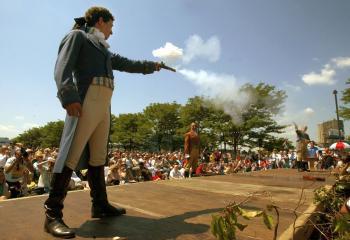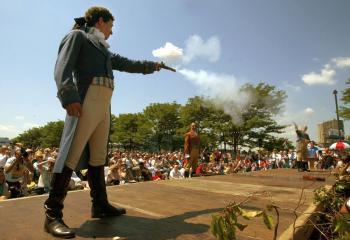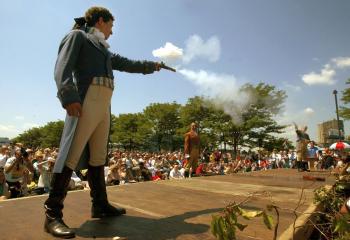NEW YORK—History remembers Aaron Burr as little more than the scoundrel who mercilessly took the life of Alexander Hamilton—the first Secretary of the Treasury whose face is immortalized on the $10 bill.
Both men were among the founding fathers of the United States—famous for their valor in the American Revolution, having a voice in the writing of the U.S. Constitution, and helping build the early foundations of today’s America.
It was on July 11, 1804 when the two took up arms against one-another. The former vice president Aaron Burr and the former secretary of treasury Alexander Hamilton met across the Hudson River in Weehawken, New Jersey in what would be the most famous duel in American history.
Debate is still ongoing over the true events that day—with the only accounts being records left from history—yet, what happened destroyed the lives of two of America’s most influential forefathers.
Hamilton is remembered as the hero of the tale, while the history of Burr is often told in a dark light; remembered as the man who killed the beloved Hamilton before being charged with treason against the United States for a later incident.
To learn the other side of the story, The Epoch Times spoke with Dr. Antonio Burr in his Manhattan office. Mr. Burr is a doctor of forensic psychology, a descendant of the Burr name, and a member of the Burr Association historical society.
“Burr was essentially a visionary rather than a traitor,” said Mr. Burr.
The Untold Story of Aaron Burr
History remembers Aaron Burr as little more than the scoundrel who mercilessly took the life of Alexander Hamilton.

Antonio Burr (L), a descendant of Aaron Burr's cousin, fires with Douglas Hamilton (R), a fiith-great-grandson of Alexander Hamilton, during a reenactment marking the 200th anniversary of the Alexander Hamilton - Aaron Burr duel July 11, 2004 in Weehawken, New Jersey. Mario Tama/Getty Images
|Updated:
Joshua Philipp is senior investigative reporter and host of “Crossroads” at The Epoch Times. As an award-winning journalist and documentary filmmaker, his works include “The Real Story of January 6” (2022), “The Final War: The 100 Year Plot to Defeat America” (2022), and “Tracking Down the Origin of Wuhan Coronavirus” (2020).
Author’s Selected Articles






